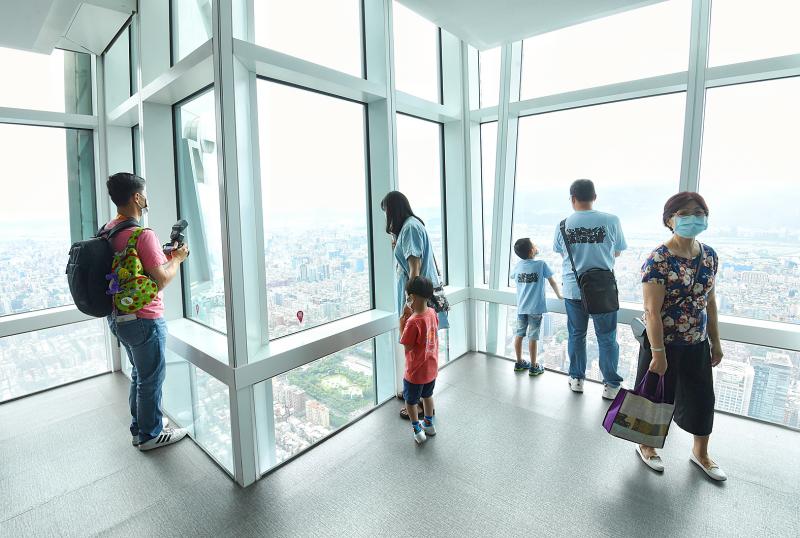The indoor observatory on the top floor of Taipei 101 has been opened to the public on a trial basis, while the cost of visiting the outdoor area has been reduced, Taipei Financial Center Corp (台北金融大樓) said yesterday.
The regular NT$300 ticket for the observatory on the 89th floor now allows visits to the indoor observatory on the 101st floor, Taipei Financial Center said.
Prior to yesterday, only “very, very important persons,” such as visiting heads of state, foreign celebrities and prime customers of Taipei 101’s shopping mall, were allowed access to the indoor observatory on the 101st floor, it said.

Photo: Fang Pin-chao, Taipei Times
Tickets for public visits to the outdoor area on the 101st floor, which previously cost NT$2,700 per person on weekends or NT$3,000 for two people on weekdays, have been sharply reduced, it said.
Visitors to the 89th floor observatory would need to pay an additional NT$999 to go up to Skyline 460, as the outdoor area on the top floor is called, the company said.
The new prices and public access are being implemented on a trial basis for this month, with visits to the top floor limited to 200 people per hour, because a special elevator is required to reach it, Taipei Financial Center said.
After the trial period, the cost to visit the indoor and outdoor areas of the top floor observatory would increase by NT$101, it said.

SELL-OFF: Investors expect tariff-driven volatility as the local boarse reopens today, while analysts say government support and solid fundamentals would steady sentiment Local investors are bracing for a sharp market downturn today as the nation’s financial markets resume trading following a two-day closure for national holidays before the weekend, with sentiment rattled by US President Donald Trump’s sweeping tariff announcement. Trump’s unveiling of new “reciprocal tariffs” on Wednesday triggered a sell-off in global markets, with the FTSE Taiwan Index Futures — a benchmark for Taiwanese equities traded in Singapore — tumbling 9.2 percent over the past two sessions. Meanwhile, the American depositary receipts (ADRs) of Taiwan Semiconductor Manufacturing Co (TSMC, 台積電), the most heavily weighted stock on the TAIEX, plunged 13.8 percent in

A wave of stop-loss selling and panic selling hit Taiwan's stock market at its opening today, with the weighted index plunging 2,086 points — a drop of more than 9.7 percent — marking the largest intraday point and percentage loss on record. The index bottomed out at 19,212.02, while futures were locked limit-down, with more than 1,000 stocks hitting their daily drop limit. Three heavyweight stocks — Taiwan Semiconductor Manufacturing Co (TSMC, 台積電), Hon Hai Precision Industry Co (Foxconn, 鴻海精密) and MediaTek (聯發科) — hit their limit-down prices as soon as the market opened, falling to NT$848 (US$25.54), NT$138.5 and NT$1,295 respectively. TSMC's

ASML Holding NV, the sole producer of the most advanced machines used in semiconductor manufacturing, said geopolitical tensions are harming innovation a day after US President Donald Trump levied massive tariffs that promise to disrupt trade flows across the entire world. “Our industry has been built basically on the ability of people to work together, to innovate together,” ASML chief executive officer Christophe Fouquet said in a recorded message at a Thursday industry event in the Netherlands. Export controls and increasing geopolitical tensions challenge that collaboration, he said, without specifically addressing the new US tariffs. Tech executives in the EU, which is

In a small town in Paraguay, a showdown is brewing between traditional producers of yerba mate, a bitter herbal tea popular across South America, and miners of a shinier treasure: gold. A rush for the precious metal is pitting mate growers and indigenous groups against the expanding operations of small-scale miners who, until recently, were their neighbors, not nemeses. “They [the miners] have destroyed everything... The canals, springs, swamps,” said Vidal Britez, president of the Yerba Mate Producers’ Association of the town of Paso Yobai, about 210km east of capital Asuncion. “You can see the pollution from the dead fish.